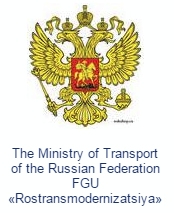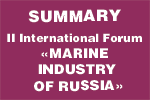International forum
“Marine Industry of Russia”
Moscow, “Gostiny Dvor”
Exhibition Hall,
May 16-18, 2012
Time left till opening of the Forum:
340 days 0 hours 28 minutes
Electronic catalogue
Search for the participant >>>
Enter the site >>>
Forum bulletin
NEWS of marine Forum
February 17, 2011
The crew of tanker “NS Century” owned by Novoship is reported by the Press Service of the shipping company to have defeated the armed attack in Indian Ocean.Sovcomflot tanker defeats armed attack in Indian Ocean
December 14, 2010
New Year special offer! Gift registration fee for participation in Forum till January 15!
October 12, 2010
“It is feasible to develop high-technology relying on domestic resources!”Interview with Lev S. Lazarev, Director General of “Muromsky Radiozavod
Quantum Activators
July 15, 2010
Seeking cost reduction ship owners and power plant manufacturers use cheap high-viscosity hydrocarbon fuels and search for technologies that lower fuel consumption. Ship diesel engines use mixtures of distillate fuels and high-viscosity cracked residues. Generally, mixtures of viscosity from 180 to 700 cSt are used. With viscosity increase, amount of fuel oil grows and fuel quality lowers which could be explained by low hydrogen content (as compared to crude oil) and respective lower calorific efficiency.
Another factor influencing lowering of calorific efficiency is high content of sulphur, nitrogen, oxygen, pitches, asphaltenes, ashes and mechanical impurities. Besides, fuel oil contains appreciable quantity of metals, including vanadium. Vanadium oxides cause low- and high-temperature corrosion (at 600–700°C) that destroys heating surfaces as well as sealing surfaces of gas turbine exhaust valves and blades.
Under international standards, mineral mass is not to exceed 0.1–0.3% of total fuel oil mass. Ashes generated when fuel oil is combusted though in small amount deposit on heating surfaces thus decreasing combustion product heat transfer. Ashes deposit on surfaces of diesel engine components cause accelerated wear of interacting surfaces and impede cooling agent heat transmission.
Fuel oil composition changes when being transported and stored. Constant oxidation, polymerization and other chemical interaction transform hydrocarbons into solid products that precipitate. Warming railway tanks with live stream in cold weather results in water content reaching 10–15%. Moreover, further storage causes additional saturation with atmospheric moisture. Quality research of fuel oil stored in a container of one petroleum depot showed water content in samples collected at 4–5 m from the bottom reaches 5% while in bottom layers, 12%.
All of it affects fuel inflammability and causes accidental pollution of a sleeve assembly, deflation valves and gas turboblowers, with combustion products.
To prevent negative effects, shipborne fuel preprocessing systems can be equipped with such facilities as dispergators, cavitators, homogenizers, etc.
Operation efficiency of such facilities can hardly be estimated since their main purpose is fixation of lenslike water contained in fuel oil. The facilities transform fuel into water-fuel emulsion use of which may cause engine failure; many manufacturers regard such failures as non-warranted.
Currently quantum activators are used worldwide. It is easy, environmentally friendly and low-cost.
Quantum activators are revolutionary fuel additives active in concentration 1 liter of activator per 10,000 liters of fuel. They enable saving: fuel consumption lowers to 20%; asphaltic tars and paraffines dissolve; SOx, NOx, CО and benzapyrene emissions reduce so that ship owners can bring air pollution in line with requirements of international conventions and agreements.
Application of quantum activators is used to implement the Federal Law Concerning Energy Saving and Energy Efficiency and is approved by the State Duma of the Russian Federation.
Until recently all fuel additives have come under those affecting fuel properties and those affecting an engine and fuel system. The first ones increase knock characteristic of gasoline (octane number) and lower diesel oil flammability (cetane number). This list also includes antibacterial, depressant and antioxidant additives and metal deactivators. The list of the second type incorporates fuel detergents, antiwear additives and fuel system cleansers. In such a case additives are chemical compounds capable of selective effect on chemical phenomena of an engine or fuel: combustion, low-temperature oxidation, corrosion, formation of pitches, varnishes and various deposits.
In the last few years in-depth study of processes that accompany operation of an internal combustion engine (in particular, self-organization) enabled emergence of fundamentally new agents which do not meet standard definition of an additive. Being added in tracer amounts, these do not affect fuel or its combustion but a combustion gas expansion process in engine cylinders. This is possible due to self-organization in gases which decreases chaotic molecule motion, energy dispersal in form of warm and increases effective capacity. The effect of these agents rests on well-known phenomena of quantum physics, so they were denominated as ‘quantum activators’. As a rule, quantum activators are liquid or solid chemical compounds very soluble in gasoline or diesel fuel. They do not contain metals or elements which when combusted generate solid particles or negatively affect an engine in other way. These natural organic substances are not harmful to humans and animals.
Quantum activators are most effective when added in modicum (from 10 to 200 grams per ton). For any quantum activator it is typical that with increase in concentration beyond a certain limit, their efficiency drops. This phenomena can be considered as a peculiar ‘business card’ of this class of products.
From 2003, the concern laboratories improved HALFRID® technology based on the above approach. Today the company produces quantum activators for any fuels (gasoline, diesel fuel, fuel oil). Navigating companies may be interested in HALFRID® diesel (KAt-D). This activator that is recommended for application with marine fuels proved to be excellent. It is of importance that as distinct from standard additives containing metals (which is utterly forbidden in European countries by Euro-3 norms and since 2009 in the Russian Federation by the Technical Regulations Concerning Requirements for Automotive and Aviation Gasoline, Diesel and Marine Fuels) and being combustion catalysts, the effect of quantum activators rests on quantum poly-resonance activation (QPRA). Being added to liquid fuel in certain concentration, they create stable resonance of thermal vibrations of hydrocarbon molecules at several frequencies. This enhances combustion and decreases toxicity of combustion products. Besides, QPRA applies to combustion gases thus increasing useful expansion effect which boosts coefficient of efficiency and decreases engine component wear.
All activators are transparent flammable liquids very soluble in hydrocarbons. They are harmless to health and are corrosive agents.
Fuel meeting all characteristics defined by TU or GOST ensure normal operation of your engines. Application of quantum activators does not alter fuel composition, so it does not violate terms of warranty provided by engine manufacturers.
News from
Read also:
- June 10, 2010 - Transas shiphandling and engine room simulators supplied for two Intership Navigation capesize bulkers
- June 03, 2010 - Comark Corp. Pilothouse Computer
- May 30, 2010 - OAO Novaya ERA Will Develop Electric Installations for Offshore Projects
- May 30, 2010 - Finnish and Russian Companies Will Design a Tanker for Oil Skimming in the Arctic Region
- May 28, 2010 - Kvichak Marine Rapid Response Skimmers for Spill
© Marine Industry of Russia, 2009-2010. All rights reserved.
By: “Ideological buiseness-projects”
Design by Valentina Ivanova.









